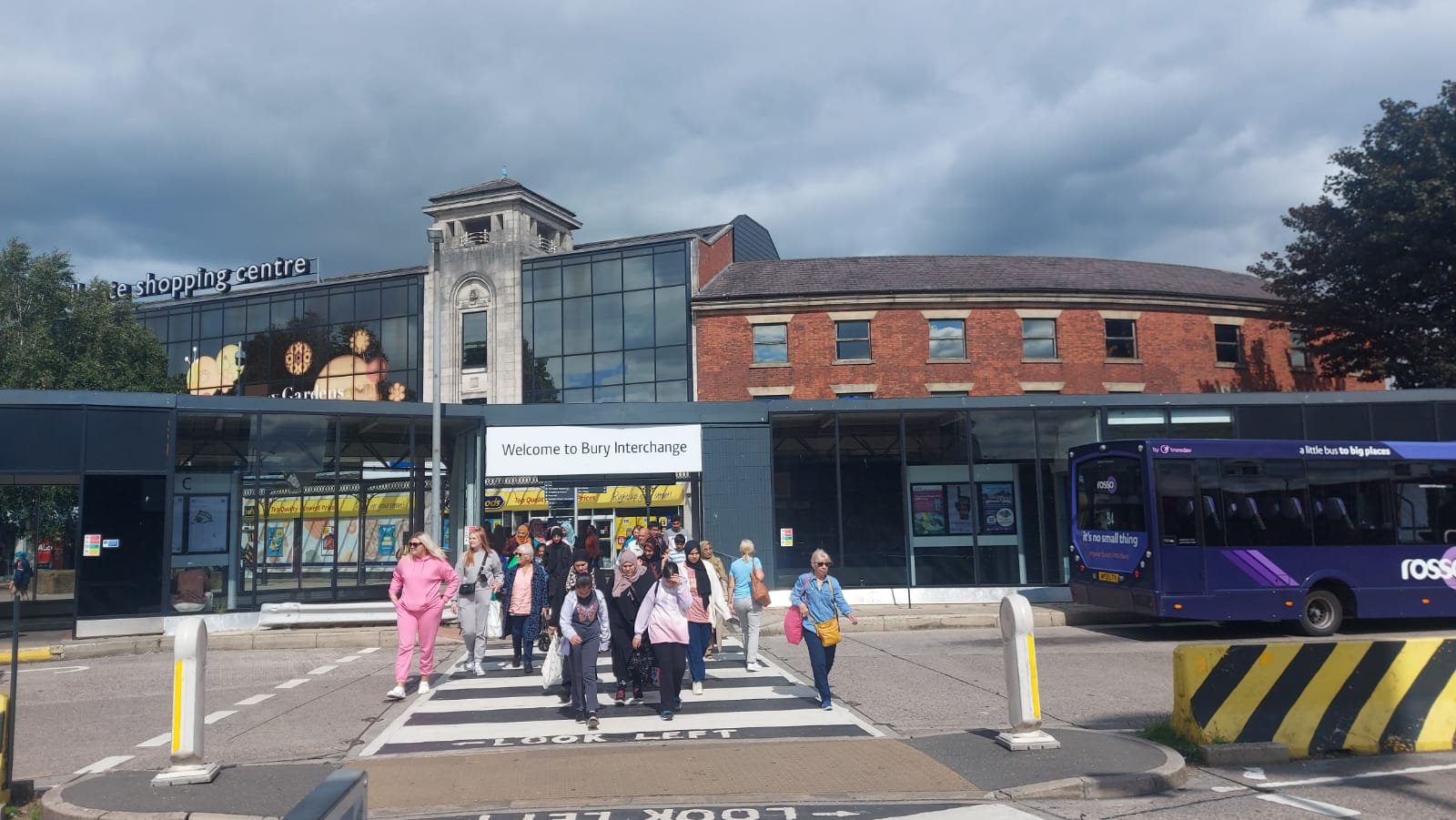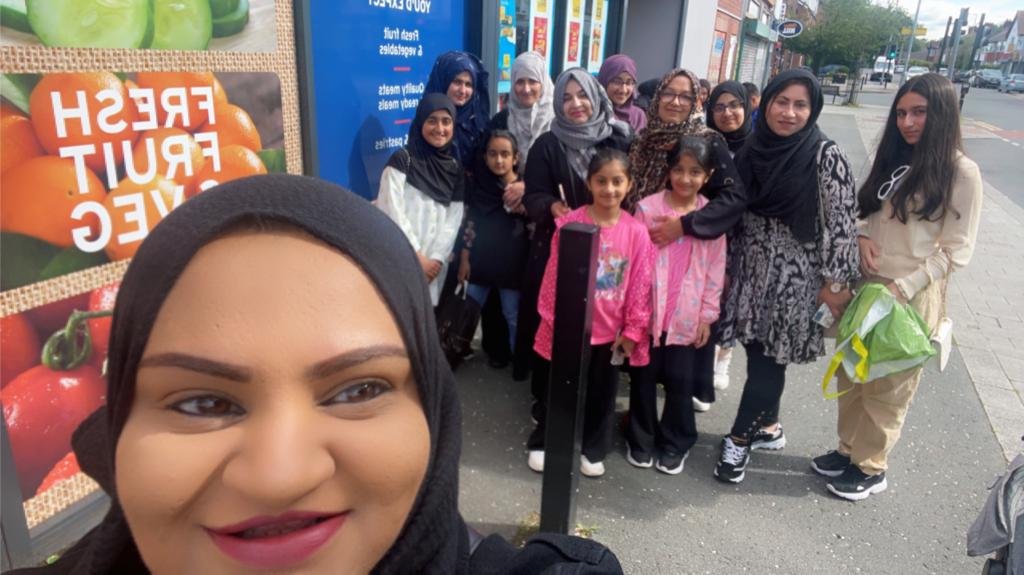Flavours from Manchester: Addressing social barriers to using public transport
As part of our first round of Community Support projects, Flavours From Manchester organised weekly public transport journeys throughout the summer to attractions and sites across Manchester.
The project aimed to address several barriers towards using public transport amongst a diverse network of communities in south Manchester, helping reduce carbon emissions by enabling individuals to choose low-carbon forms of travel more frequently and leave the car at home.
From A to B
Shaeda first came up with the idea for her project when she noticed that her mother needed someone to drive her to the airport, despite living only a few minutes’ walk away from a train and tram station that would take her directly there.
As a result, Shaeda wanted to help remove the barriers to using public transport for her community and help get them confident and able to ditch the car and opt for public transport. She told us that, “this lack of confidence in using public transport must be tackled to reduce the emissions from car use. Providing support and often translation is a great way to remove those access barriers.”
“Thanks to the project, Farrah, one of the participants now feels confident using public transport. She was quite apprehensive and thought that it was dangerous but since taking part she feels encouraged to travel now using public transport rather than the family car”
By applying for In Our Nature Community Support, Shaeda was provided with bus, train, and tram tickets for her group. We were also able to offer advice and guidance throughout the project’s lifetime, as well as support with measuring the project’s impact.
All aboard!
Organised trips helped members of the group overcome the fear of getting on the bus or taking the tram for the first time and showed them how easy it was to use public transport to get to places they would normally only travel to by car.
The project showed participants how to book train tickets and how to navigate to their destination using their smart phones. The project also helped familiarise the group with using maps and building skills to know their surroundings and get home safely.
By visiting local parks, the group were encouraged to appreciate and explore the natural environments around Manchester, whilst helping build an awareness of climate change, its impact and how individuals can make change.
Shaeda told us, “We spoke about how the changing environment is affecting all of us, how the use of vehicles is continually damaging the environment and how, by not using the car, we contribute towards reducing carbon emissions.
The project successfully created a lot of awareness in this group and encouraged them to rethink their own ways in which they will contribute to reducing the impacts of climate change.”
Community impact
Flavours from Manchester engages with many communities across the city including Afghan refugees, African Caribbean women, Kurdish women, Arab women, Pakistani-heritage women, and young people.
By encouraging active travel and building confidence, particularly among children and their parents who rely on cars and experience language barriers, the project enabled 35 women to start using public transport on a regular basis.
“I have never been on any public transport before but now I can go to town, Oldham, Bury, the Trafford Centre, all around Manchester on my own. I am quite confident now Alhumdulillah. I feel like giving five stars to this project and baji Shaeda.” – project participant
The project gave people the skills to travel alone safely and confidently, to use different modes of public transport, explore different parts of Manchester, and learn how to purchase tickets and organise trips and days out on public transport, which, prior to the project, they had never attempted. Shaeda told us that, “The group members felt that they had tackled many of the barriers that previously discouraged them from using public transport”.
“I had a great experience I used public transport after 15 years and it was so convenient and made me realise, I don't need a car all the time to get around I can use public transport. I had great fun thank you for this project and Shaeda who was so well organised and managed the group so well.” - Asma, project participant
100% of participants now feel more confident using public transport,
60% of participants are now using public transport once a week
“It was a wonderful experience and just goes to show that you can get around places quite easily on public transport. I will surely be planning more days out using public transport.” –
Shabana, project participant
In addition to learning how to use public transport, children and their mothers benefitted from this project by making friends, voicing their opinions and concerns, and talking about their challenges. They learnt to analyse their own carbon footprint, as well as how to recycle and upcycle things as part of a group trip to a repair café in Levenshulme.
The project also teamed up with Station South to provide bike riding sessions to the women, many of whom had never ridden a bike before. One individual enjoyed the sessions so much, she’s now going to buy her very own bike.
“I did the learn to ride a bike at the start of this project, it was always on my list of things to do, and I thoroughly enjoyed it. I learnt how to balance and although I did not use the pedals, I feel more confident and hopefully will resume this activity at some time in the future.” - project participant
Carbon savings
A total of 14 public transport trips were taken by members of the group during the project, covering a total of 134.9 miles. This saved 732.41kg C02.
By taking public transport instead of driving a car, the project was able to save 732.41kg’s of carbon from entering the atmosphere.
So, where to next?
We only anticipate these carbon reductions to further increase over time, as those involved in the project continue to choose low-carbon methods of transport over their cars and share their experiences with even more people in their communities.
A WhatsApp group, set up during the project, will help people continue to stay in contact with one another and share upcoming events and opportunities. Shaeda has continued her work with a second round of community support focussing on diabetic and pre-diabetic individuals, find out more here.







